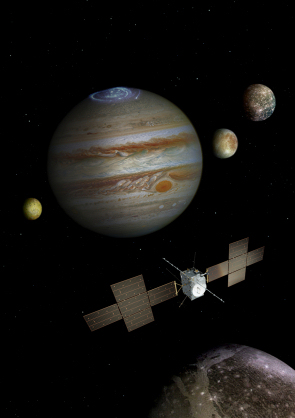JUICE mission gets green light for next stage of development
27 November 2014
The European Space Agency's JUICE (JUpiter ICy moons Explorer) mission has been given the green light to proceed to the next stage of development. This approval is a milestone for the mission, which aims to launch in 2022 to explore Jupiter and its potentially habitable icy moons.JUICE gained approval for its implementation phase from ESA’s Science Programme Committee during a meeting at the European Space Astronomy Centre near Madrid, Spain, on 19 and 20 November 2014.
Chosen by ESA in May 2012 to be the first large mission within the Cosmic Vision Programme, JUICE is planned to be launched in 2022 and to reach Jupiter in 2030. The mission will tour the giant planet to explore its atmosphere, magnetosphere and tenuous set of rings and will characterise the icy moons Ganymede, Europa and Callisto. Detailed investigations of Ganymede will be performed when JUICE enters into orbit around it – the first time any icy moon has been orbited by a spacecraft. During its lifetime, the mission will give us an unrivalled and in-depth understanding of the Jovian system and of these moons.
The scientific goals of the mission are enabled by its instrument suite. This includes cameras, spectrometers, a radar, an altimeter, radio science experiments and sensors used to monitor the plasma environment in the Jovian system. In February 2013, the SPC approved the payload that will be developed by scientific teams from 16 European countries, the USA and Japan, through corresponding national funding.
At the November 2014 meeting of the SPC, the multilateral agreement for JUICE was also approved. This agreement provides the legal framework for provision of payload equipment and ongoing mission support between funding agencies. The parties to the agreement are the European Space Agency and the funding agencies of the European countries leading the instrument developments in the JUICE mission: the Agenzia Spaziale Italiana (Italy); the Centre National d’Etudes Spatiales (France); the Deutsches Zentrum für Luft- und Raumfahrt e.V. (Germany); the Swedish National Space Board, and the United Kingdom Space Agency. Austria, Belgium, the Czech Republic, Greece, Poland, and Switzerland participate via the PRODEX programme.

